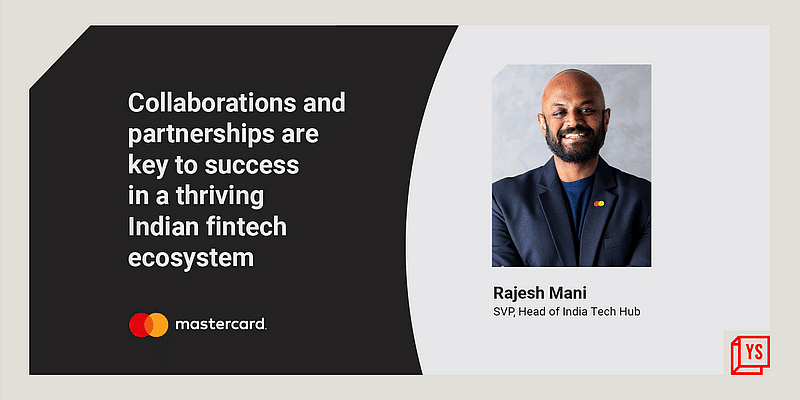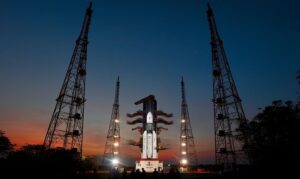Founded in 2014, Mastercard’s India Tech Hub is a dream workplace for many tech enthusiasts. It is where the company’s digital payment solutions and technologies come to life. Rajesh Mani, who has recently been appointed as Head of the company’s India Tech Hub, speaks to YourStory about how the India Tech Hub is building an employee-centric culture while contributing to the greater social good.
Edited excerpts from the interview:
YourStory [YS]: How has been the journey of Mastercard Technology Hub in India since its inception?
Rajesh Mani [RM]: Mastercard Tech Hub supports in bringing the company’s digital payment solutions and technologies to life. Since the inception of India Tech Hub in 2014, our employee base has grown multifold from a humble 300-400 people to now over 5,000 technologists in Pune and Vadodara. The India Tech Hub today is the largest technology hub of Mastercard outside the US.
Multiple technology teams at the Hub work on supporting tech development, with our global and regional teams to help implement solutions that facilitate faster, smarter, and safer cashless payments. The India Tech hub houses the majority of Mastercard’s workforce in the country. Over the years, the Tech Hub has also grown its capabilities and today is home to a variety of teams across operations and technology, cyber and intelligence, data and services as well as product and engineering domains. The Tech Hub is a testimony to Mastercard’s commitment to India in regard to investment in technology, talent as well as enabling local partnerships and solutions.
[YS]: Tell us about your leadership role at Mastercard and the initiatives that you will be driving.
[RM]: As a Lead for India Tech Hub, I will be collaborating with the global teams in building strategic engagements with key stakeholders to support Mastercard’s products and services. Besides, nurturing talent and promoting inclusive culture will be a major focus. With my diverse experience and understanding of the financial services sector, I will focus on supporting and building a business at Mastercard that delivers to the needs of our stakeholders.
[YS]: Mastercard has been an important contributor to creating the payments ecosystem in India working closely with regional partners on cutting-edge payment technologies. Can you elaborate on this?
[RM]: We’ve been fortunate to be a part of India’s growth story for over three decades now. Through our collaborations and partnerships, we’ve been able to contribute to making the payments ecosystem stronger in several ways:
a. Improving digital acceptance: We are continuously working with financial institutions and supporting merchant partners to recognise and explore new technologies in digital payments, data analytics solutions, financial services etc. For example, Mastercard partnered with the Confederation of All India Traders (CAIT) to jointly enable access to digital learning for 1 crore Indian traders in remote areas across 300 cities by 2022. Besides, initiatives such as the Team Cashless India campaign have been engaging with merchants and consumers to create awareness about digital payments.
b. Enhancing safety and security: With innovations in technology, we seek to replicate within a domestic environment the highest levels of security and criticality, leveraging our latest mobile and AI tools. We supported in:
1. Implementing multiple layers of protection to significantly reduce the risk of fraud
2. Launching EMV 3D-Secure 2 protocols that allow banks to authenticate over 95 percent of transactions and ensure frictionless mobile payment, this helps predict and pre-empt cyber fraud
3. Leveraging our global network Safety Net, which helps identify unusual behaviour and potential attacks even before the bank, processor, or merchant is even aware
4. Working with all stakeholders in the Indian payments ecosystem to make sure that every card is token-ready
c. Making payments faster, smarter: We continue to innovate on technologies and applications to facilitate faster, smarter, and safer cashless payments. For example, contactless payments, real-time payments etc.
d. Driving financial inclusion: During the COVID-19 pandemic, we announced a commitment of Rs 250 crore ($33 million) to help reboot Indian SMEs and enable business recovery. As a part of it, we have rolled out various initiatives to improve digital payments awareness among small businesses, and provided low-cost acceptance online and offline solutions that are simple, safe, and secure. We also focus on empowering women entrepreneurs by increasing their business acumen; working with various institutions to bring more women into fintech, and supporting women business owners. Besides, Mastercard partnered with LEAF to expand financial inclusion and increase the incomes of more than 1 million farmers.
e. Nurturing a talent pool of payment technologists: Mastercard works with different stakeholders locally and globally to create an environment for inclusion and change the perception of STEM-related careers among young girls. At the India Tech Hub, we continue to upskill and foster talent in the country in the payment technology space. As we’re growing consistently, we are hiring and developing technologists with a special focus on skill sets like data analytics, automation and software development, among other skills.
[YS]: How is the company planning to operate within the thriving fintech ecosystem in India?
[RM]: We’ve been in the payments business for many decades now and across diverse markets. The way we continue to be successful is by staying focused on our strategy and working through collaborations and partnerships wherever we are, not only to leverage our global scale and capabilities but also to develop and implement local solutions.
We work closely with the startup ecosystem via our flagship Start Path program that supports them in developing next-generation, breakthrough commerce solutions. With more than 250 startups in the Start Path program since its founding in 2014, these companies have gone on to raise $2.9 billion in post-program investments and are delivering solutions that are transforming the future of commerce.
Given the potential of technology innovations in the payments industry in India, we have established an India Investment Fund to support early-stage startups with capital and access to Mastercard’s system and expertise. For example, we have invested in Syntizen, which delivers Aadhaar-based authentication solutions; we have also invested in Zeta to offer credit management offerings and card-processing product stack; Instamojo to offer small and micro merchants a ready-made virtual platform upon which they can quickly set up an e-commerce business and accept digital payments; and Pine Labs, to offer a suite of value-added services and end-to-end stored value solutions.
[YS]: How is Mastercard supporting women in technology and addressing the skill gaps?
[RM]: We support women-in-tech at the workplace through ample upskilling, career development, and mentorship opportunities enabling them to take on more challenging roles and work on key projects. We are also empowering women to move from non-tech to tech roles within Mastercard. Our return-to-work programs are aimed at supporting women on a career break to re-enter the corporate workforce. The program provides mentorship, tools, and support to ease their path back to working life.
Besides, we realise that a sustainable way to enhance the funnel of women to join the tech workforce is by inspiring more young girls to take up STEM education and careers. Our signature STEM program Girls4Tech is a hands-on, inquiry-based STEM programme designed to help young girls become tech leaders of tomorrow. Having reached out to 1 million young girls globally, Mastercard has set a new goal of inspiring 5 million girls by 2025.
[YS]: Tell us about Mastercard’s inclusive culture and how do you ensure the company continues to thrive as one of India’s great places to work?
[RM]: A diverse workforce means building a team with different ideas and approaches to make better decisions, drive innovation, and deliver better business results. While our people-policies are focused on enabling the best work-life balance, we also strive to ensure that our people are supported in their endeavour to continually learn, upskill, and build an enriching career and life for themselves. Besides our leaders walking the talk when it comes to D&I, our employee-led Business Resource Groups drive on-ground events and initiatives across various offices – to enhance awareness, foster inclusion, and support our diversity hiring objectives.
Over the years, Mastercard has been recognised as a top employer as well as among the best workplaces for women by Great Place to Work® as well as by Working Mother and AVTAR. We were also named a ‘Gold Employer’ in Pride Circle’s India Workplace Equality Index (IWEI) 2021 recognising us among the nation’s top organisations to embed LGBT+ inclusion in their policies, hiring practices and external communication, while demonstrating a long-term and in-depth commitment to inclusion. More recently, we were awarded across categories for our innovative diversity practices at the JobsForHer DivHersity Awards 2022.
Our culture is driven by our employees and these accolades are testimony not only to our policies but also our people and what they do every day to make Mastercard a more inclusive and diverse workplace.










